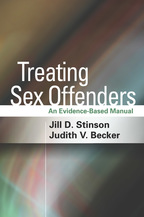Treating Sex Offenders
An Evidence-Based Manual
Jill D. Stinson and Judith V. Becker
“Stinson and Becker have opened a new and optimistic chapter in the so-far frustrating search for solutions to sexual violence. Offering respectful criticisms of prior therapeutic approaches, they provide an alternative that is standardized, can be systematically evaluated, and is supported by preliminary empirical studies. Ultimately, desistance from sexual crime depends on each offender's willingness to change; fortunately, the approach in this book is adherent to well-known principles of prosocial behavior change. Beautifully written, this comprehensive, practical treatment guide promises to be used and tested for years to come.”
—Joel A. Dvoskin, PhD, ABPP, Department of Psychiatry, University of Arizona College of Medicine
“An enormously important contribution. In the last three decades, the approach to sexual offending has been almost unrelentingly punitive. Stinson and Becker outline a rigorous, empirically grounded approach to treatment, in a style that is accessible and clear. This book needs to be on the shelf of anyone assessing or treating someone who has committed a sexual offense. It will stand as a landmark in the evolution of sex offender treatment.”
—John Petrila, JD, LLM, Vice President of Adult Policy, Meadows Mental Health Policy Institute, Dallas, Texas
“This manual addresses a vital criminal justice and public health issue. Without losing sight of public safety concerns, the authors identify methods for establishing a caring, empathic therapeutic alliance. The importance of basing therapeutic interventions on well-documented empirical evidence is properly emphasized. This is a thought-provoking work that educates rather than indoctrinates. It will be a useful resource for both clinicians and students.”
—Fred S. Berlin, MD, PhD, The Johns Hopkins University School of Medicine; Director, National Institute for the Study, Prevention, and Treatment of Sexual Trauma
“This authoritative account of the SOS program by leading experts represents an important addition to the literature on treatment for sexual offending. SOS is founded on an incisive model of self-regulatory processes in affective, cognitive, behavioral, and interpersonal domains. This innovative, step-by-step manual warrants the attention of researchers and practitioners who are committed to reducing the serious and lasting harm inflicted on society by sexual offenders.”
—Christopher J. Patrick, PhD, Department of Psychology, Florida State University
Table of Contents
1. A New Approach to Treating Sex Offenders2. Theoretical Foundation of Safe Offender Strategies
3. Using Safe Offender Strategies: Pragmatic Considerations
4. Case Conceptualization and Working with Clients
5. Module 1—Why Am I in Treatment?
6. Module 2—Basic Treatment Concepts
7. Module 3—Emotions and Emotion Regulation
8. Module 4—Sexuality and Sexual Behavior
9. Module 5—Review of Motivation, Commitment to Treatment, and Treatment Goals
10. Module 6—Expectations and Beliefs about Interpersonal Relationships
11. Module 7—Dysregulation and Interpersonal Relationships
12. Module 8—Coping with the Past
13. Module 9–Making Good Choices: Managing Urges and Behavior in a Healthy Way
14. Module 10—Motivation, Commitment, and Treatment Goals
15. Family and Community Reintegration: Preparing the Client for Aftercare
Appendix A. Client Aftercare Packet
Appendix B. Additional Client Handouts
About the Authors
Jill D. Stinson, PhD, is Assistant Professor in the Department of Psychology at East Tennessee State University. Dr. Stinson formerly served as the Sex Offender Treatment Coordinator at Fulton State Hospital with the Missouri Department of Mental Health. She has worked with sexual offenders with serious mental illness, intellectual/developmental disabilities, and personality disorders, as well as with sexually violent predators. Her research focuses broadly on psychopathology and sexual offending, self-regulatory processes in persons with a history of sexual offending and violent behavior, and specialized assessment and treatment needs of forensic populations. Dr. Stinson is a member of the Association for the Treatment of Sexual Abusers and the American Psychology-Law Society.Judith V. Becker, PhD, is Professor in the Department of Psychology at the University of Arizona. Dr. Becker is a past president of the Association for the Treatment of Sexual Abusers and the International Academy of Sex Research, has served as editor of Sexual Abuse: A Journal of Research and Treatment, and continues to serve on a number of editorial boards. Her clinical research has focused on both adolescent and adult sex offenders as well as victims of sexual abuse and aggression. Dr. Becker is the author or coauthor of over 100 published journal articles and book chapters in the professional literature. She also consults on both criminal and civil forensic cases.
